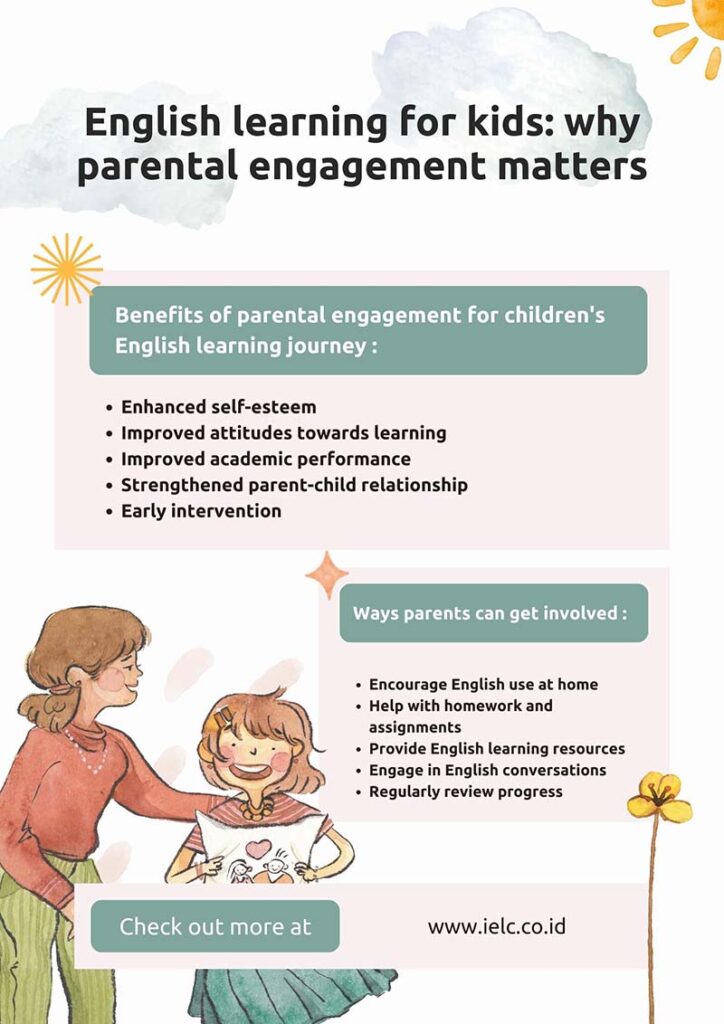
English learning for kids: why parental engagement matters
How often have you, as a parent, caught yourself wondering, “Am I doing enough to support my child’s English learning? Or is it sufficient that they’re already enrolled in English classes?” Perhaps you’ve asked, “Do I need to be fluent in English to help my child?”
You’re not alone in asking these questions. Many parents we talk to express similar doubts, often believing that their own proficiency in English might limit their ability to support their child’s language acquisition.
Well, we’re here to shed some light on these concerns and dispel the myth that you need to be an English language expert to nurture your child’s English learning journey. Quite the contrary, your role as a parent can be pivotal, regardless of your own fluency level!
In this blog, we’re going to delve into the science behind why parental involvement is so essential in English learning for kids, and more importantly, how you, regardless of your own English proficiency, can be effectively involved!
Let’s debunk a myth right off the bat, shall we? You don’t need to be an English expert to support your child’s language learning journey. A surprise, isn’t it?
Keep reading to discover the research-backed benefits of parental engagement and practical tips on how you can actively participate in your child’s English learning process. Let’s get started!

Benefits of parental engagement for your child’s English learning journey:
- Enhanced self-esteem
We all like a little pat on the back, don’t we? Especially when we are trying our best to learn something new and challenging.
Well, the same applies to our children, if not even more so!
Picture this. Your child comes home from their English class and excitedly shares a new English phrase they learned. Instead of a simple nod, you pause, you listen, and you celebrate their achievement with them. You say, “Wow, you’ve done such a fantastic job!”
This validation, this recognition, does wonders for your child’s self-esteem. It’s the simple act of being involved and showing that you value their learning that can make a world of difference to how they perceive themselves.
Their thought process becomes, “My parents value my learning. My efforts matter.” This is a powerful motivator and can be a significant boost to their English learning journey.
- Improved attitudes towards learning
Remember when we were kids, and how our parents’ attitude towards certain things shaped our own opinions?
Our children are no different. Our enthusiasm and attitude towards English can significantly influence their mindset. If we approach it with curiosity and excitement, they are likely to do the same!
By being involved, we can model a positive attitude towards learning English, show them that making mistakes is a part of learning, and that it’s completely okay!
This helps nurture a positive and open mindset, and children approach English learning with more enthusiasm and less anxiety!
- Improved academic performance
Numerous research studies show a positive correlation between parental involvement and a child’s academic performance. In 2002, a study by Keith Zvoch published in School Psychology Review showed that parental involvement resulted in higher academic achievement among students, including in language proficiency.
Interestingly, your involvement in your child’s English learning doesn’t necessarily mean you have to be an English expert yourself. Instead, the process can be seen as a collaborative learning journey where your child also plays the role of a teacher!
It’s a well-established educational theory that one of the best ways to master a subject is to explain it to someone else. This method, often referred to as the Feynman Technique after the renowned physicist Richard Feynman, encourages deeper understanding and better retention of information.
By having your child explain different English topics to you, they get to reinforce their learning, and you both get to enjoy quality time together. Remember, it’s the joint effort and mutual learning experience that ultimately lifts your child’s academic performance!
- Strengthened parent-child relationship
Active participation in your child’s English learning process can transform an ordinary educational journey into an extraordinary bonding experience!
The whole process is not just about aiding your child’s English proficiency—it’s about the shared thrill of delving into a new storybook, or the mutual satisfaction of cracking a challenging grammar concept.
When you involve yourself in your child’s learning process, you’re not just building their linguistic skills, you’re also contributing to a shared tapestry of experiences and memories.
This active engagement from your side not only offers support to your child’s learning but also establishes a platform for open communication and understanding between the two of you. In essence, you are not just nurturing a budding English learner, but also fostering a deeper connection with your child through the vehicle of shared learning!
- Early intervention
A significant advantage of parental involvement is the ability to identify and address potential difficulties in the learning process promptly. When parents are intimately familiar with their child’s English learning journey, they’re more likely to notice if their child is grappling with certain aspects of the language, be it pronunciation, grammar, or vocabulary.
By recognizing these struggles early on, parents can take steps to address them—through additional practice, resources, or professional help. With your attentive involvement, you’ll be equipped to help your child overcome their English learning hurdles, making the journey smoother and more enjoyable for them!
Ways parents can get involved:
- Encourage English use at home
As the saying goes, practice makes perfect, and there’s no better place to foster a daily habit of English use than the comfort of your own home!
Whether it’s incorporating English phrases into your everyday conversations, labeling household items in English, or even having English-only hours or days, these strategies can turn your home into a living language lab! This immersive environment allows your child to naturally and effortlessly associate English words and phrases with their daily routines and experiences.
The beauty of it is, not only will this provide a supportive space for your child to practice English, but it will also present numerous spontaneous opportunities to learn new vocabulary and phrases in a natural context!
- Help with homework and assignments
Every parent knows the drill – the school day might end when the bell rings, but the learning journey often extends far into the evening hours with homework.However, homework isn’t just about getting extra marks; it’s an important tool to reinforce what your child has learned in class.
Now, we’re not suggesting that you do their homework for them — quite the opposite, actually!
The idea is to be there as a guide, someone who facilitates their thought process and helps them find their way around difficult questions. For example, if they’re stuck on a tricky grammar question, instead of giving the answer outright, help them remember the relevant rules or direct them to resources where they can find the solution.
This not only encourages problem-solving skills but also promotes independent learning, a skill that will serve them long past their school years.
- Provide English learning resources
In today’s digital age, there’s a wealth of resources available at your fingertips to support your child’s English learning journey. From language learning apps and educational websites to illustrated books and English language cartoons, these resources make learning English fun and engaging.
Perhaps, consider creating a cozy reading corner at home stocked with age-appropriate English books. Encourage your child to dive into the magical world of stories, which will inadvertently improve their vocabulary and language comprehension. Alternatively, educational apps that gamify English learning can be a great hit, especially with the younger, tech-savvy generation.
By curating a diverse mix of English learning resources, you not only help broaden your child’s language skills but also make learning an enjoyable experience.
- Engage in English conversations
It’s important to remember that language is not just about vocabulary and grammar – it’s about communication. And what better way to practice communication than through conversations?
Engage your child in daily English conversations, no matter how simple. Discuss their day at school, talk about their favorite games, or debate the best superhero – all in English!
This informal practice allows them to apply the vocabulary and grammar rules they’ve learned in a practical context. It’s also a great opportunity for you to correct their mistakes in real-time and guide them on the correct usage.
- Regularly review progress
Last but not least, taking the time to review your child’s progress is an integral part of their English learning journey. Make it a point to assess what they have learnt, what they’re excelling in, and what areas need more attention!
This doesn’t have to feel like an examination or a test. It can be as simple as a weekly discussion about what they’ve learned and what they found challenging.
Regular check-ins also signal to your child that you’re involved and invested in their learning, which can be a powerful motivator. Always remember to approach these reviews with encouragement and patience – after all, learning is a marathon, not a sprint!
Do you want your child to speak with confidence and fluency?
So many children in Indonesia lack confidence when they speak English. They are worried about making mistakes and are embarrassed to speak in front of others. This is because they have been taught English the wrong way!
At IELC, we teach English the right way so your child can express themselves with confidence and fluency. Whether it’s online or on campus, we create positive learning environment where your child will feel warm and welcome, where they can learn and have fun at the same time.
The best English course for kids in Indonesia
With so many courses available, it can be confusing to know which course to choose.
With an average rating of 4.9 out of 5 stars from more than 300 reviewers on Google Review, IELC is the highest ranked best English language course in Indonesia.
We teach English the right way so that your child gain confidence and fluency.
With these skills, they can unlock their potential and fulfill their dreams!
Our experienced teachers will guide your child along every step of the learning process to ensure the best learning outcome.
As Indonesia’s #1 English Campus, we offer great courses for kids, teens, and adults:
- Online courses for kids
- Online courses for teens
- Online courses for adults
- On campus courses for kids
- On campus courses for teens
- On campus courses for adults
- Online and on campus IELTS course
- Online and on campus TOEFL course
Whether it’s online or on campus, we will help your child gain the skills they need for their future. Contact us to start your child’s journey towards confidence and fluency today!
Sincerely,

IELC Academic Director
